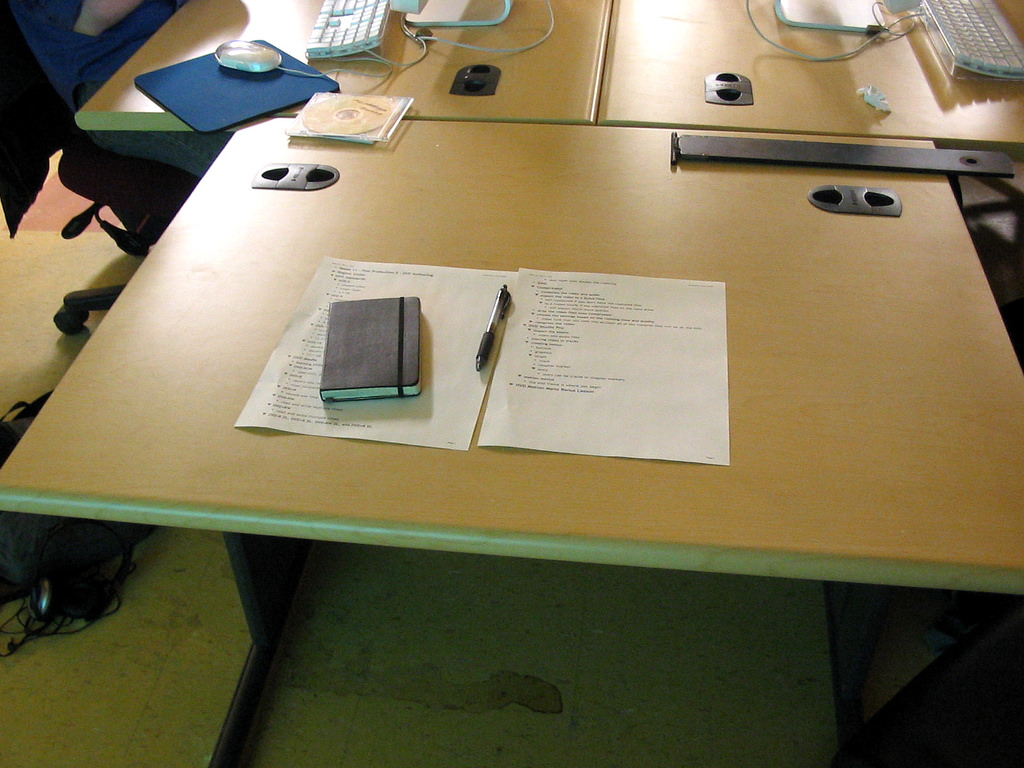
Writing a lesson plan will ensure that you are prepared for your class and will make it run more smoothly. It is important to break the material up into several sections and choose activities suitable for each. Knowing approximately how much time an activity will take is important, but after the first lesson you may need to adjust things accordingly. It is best to be flexible seeing as different classes will respond to material differently. If at any point students struggle, you will have to dedicate more time to instruction or drilling before moving on to practice activities. For the purposes of this example let’s assume that an English class is forty-five minutes long.

Does your own lesson plan look like this? Image credit: Chris Campbell, Flickr
How To Write a Perfect Lesson Plan
-
1
Warm up
A warm up activity can be used in a number of ways. It can get your students thinking about material that will be used later on in the class, review material from a previous class, or simply get your students thinking in English, moving around, or awake. This activity should only take up a small portion of your lesson, perhaps five minutes. -
2
Introduction
A good introduction will create a need for students to learn the material you are going to present and get them interested in the day’s topic. This is the part of the lesson where the teacher does the most talking so try to get students involved and use choral repetition to keep students talking about half the time. Depending on how complex the topic is or how much new vocabulary there is, the introduction could take some time but in most cases, about ten minutes should be sufficient. -
3
Practice
The practice activity would normally be about ten minutes and have students working individually or in pairs. Practicing model dialogues, completing worksheets, and doing short activities would be appropriate. This may take about ten minutes including going over the answers or having some demonstrations. -
4
Production
In the production activity students should have to produce material on their own. Rather than reading sentences, perhaps they have to answer questions or make their own sentences. Longer activities such as board games, which can be played in groups, or activities for the whole class, where students work in teams, would be best. The remaining class time can be devoted to this activity. -
5
Review
It is a good idea to plan another five minute activity that can be done at the end of class as a review or used as the warm up in the following lesson. If the production activity does not take up the remaining portion of the class period, you have a backup plan.
The idea behind a lesson plan is that another teacher could pick it up and successfully teach your class without further instructions.
Important
When writing lesson plans, be sure to include:
• What part of the textbook you are covering in the lesson
• The target structure
• New vocabulary
• Directions for all the activities you intend to use
• The approximate time each section of your lesson will take
The idea behind a lesson plan is that another teacher could pick it up and successfully teach your class without further instructions. If there is an activity where you plan to ask the students questions so that they use the past tense in their responses, write down the questions you plan to ask. It is more difficult to think of appropriate questions on the spot and you are more likely to ask them a question using vocabulary they are unfamiliar with as well. If there is a group activity in the lesson, write down about how many students should be in each group because two to four students is a lot different than five to ten. Writing out your lesson plan can also help you figure out what material you must prepare for a lesson because if your production activity will only take about ten minutes, then you are obviously going to need an additional activity to end the class with.

Not all lessons will be conducted the same. In some instances, the introduction of new material may take an entire lesson or the production activity may be an entire lesson. It is always good to have familiar activities to fall back on in case something doesn’t work quite the way you had planned. If students are playing the board game without actually speaking, in other words just moving their pieces around the board, they are not getting the necessary practice so you may have to either join the group having difficulties or change activities altogether.
At any rate, lesson plans are enormously helpful and if the following year you find yourself teaching the same material, preparation will be a breeze.
Do you have any advice on how to write lesson plans? Please share your best practices in the comments below!
P.S. If you enjoyed this article, please help spread it by clicking one of those sharing buttons below. And if you are interested in more, you should follow our Facebook page where we share more about creative, non-boring ways to teach English.








